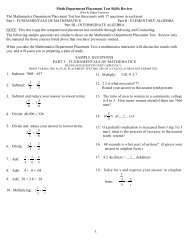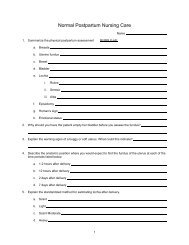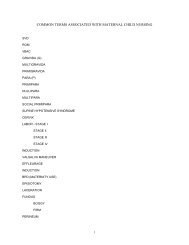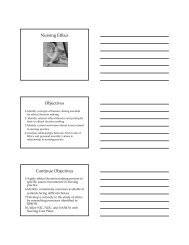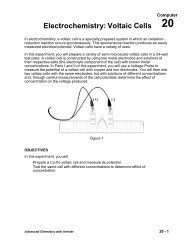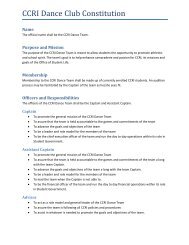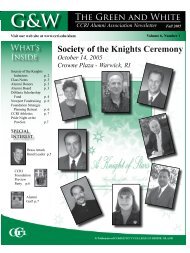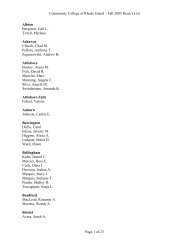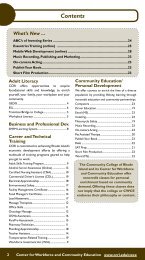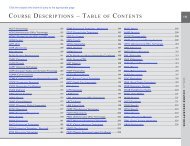Course Descriptions - Community College of Rhode Island
Course Descriptions - Community College of Rhode Island
Course Descriptions - Community College of Rhode Island
Create successful ePaper yourself
Turn your PDF publications into a flip-book with our unique Google optimized e-Paper software.
MLTC 2910 - Clinical Microbiology II<br />
(5 weeks) - 4 Credits<br />
This course provides practical application<br />
<strong>of</strong> principles and techniques that have<br />
been previously learned. Students learn<br />
by doing actual testing at the bench with<br />
the same exposure to realistic conditions<br />
under which a technician works. <strong>Course</strong>work<br />
involves skill development <strong>of</strong> clinical<br />
bacteriology, mycology and parasitology.<br />
(Prerequisite: MLTC 2110) Lab: 32 hours/week<br />
MLTC 2920 - Clinical Hematology<br />
(4 weeks) - 4 Credits<br />
This course provides practical application<br />
<strong>of</strong> principles and techniques that have been<br />
previously learned. Students learn by doing<br />
actual testing at the bench with the same<br />
exposure to realistic conditions under<br />
which a technician works. (Prerequisite:<br />
MLTC 2120) Lab: 32 hours/week<br />
MLTC 2930 - Clinical Laboratory<br />
Science Seminar - 2 Credits<br />
The course examines case studies as they<br />
relate to hematology, clinical chemistry,<br />
microbiology, urinalysis, immunohematology<br />
and immunology. Computer programs<br />
and audiovisual slides are used to enhance<br />
students’ knowledge base. (Corequisite:<br />
MLTC 2910 or 2920 or 2990 or department<br />
permission) Lecture: 3 hours<br />
MLTC 2990 - Clinical Chemistry II<br />
(4 weeks) - 4 Credits<br />
This course provides practical application<br />
<strong>of</strong> principles and techniques that have been<br />
previously learned. Students learn by doing<br />
actual testing at the bench with the same<br />
exposure to realistic conditions under<br />
which a technician works. (Prerequisite:<br />
MLTC 2190) Lab: 32 hours/week<br />
mnfg (mAnufACTuring)<br />
MNFG 1020 - Robots in Manufacturing -<br />
5 Credits<br />
This is a one-semester course providing<br />
students with an introduction to robot use<br />
in manufacturing. The student will explore<br />
the industrial use <strong>of</strong> robots in work cells<br />
and assembly operations and general flexible<br />
manufacturing operations also are<br />
explored. Lecture: 3 hours, Lab: 4 hours<br />
mriC (mAgneTiC<br />
reSonAnCe imAging<br />
CerTifiCATe)<br />
MRIC 2260 - Introduction to Magnetic<br />
Resonance Imaging - 6 Credits<br />
This course provides students with a<br />
knowledge <strong>of</strong> MRI image production,<br />
including image acquisition and reconstruction.<br />
The selection <strong>of</strong> scan protocols<br />
will be related to anatomical region, patient<br />
history and physical condition. Attention is<br />
given to patient education, screening and<br />
care. Clinical application is part <strong>of</strong> this<br />
course. Anatomical regions <strong>of</strong> the head<br />
and neck, spine, thorax and abdomen are<br />
considered. (Prerequisite: Registered radiographer)<br />
Lecture: 3 hours, Clinical: 16 hours<br />
MRIC 2270 - MRI Physics and<br />
Instrumentation - 3 Credits<br />
This course provides students with a basic<br />
understanding <strong>of</strong> the physics <strong>of</strong> magnetic<br />
resonance imaging and the instrumentation<br />
used to acquire MRI images. The basic<br />
principles <strong>of</strong> electricity and magnetism are<br />
addressed, as well as the characteristics <strong>of</strong><br />
radio frequencies and the phenomenon <strong>of</strong><br />
resonance. Application <strong>of</strong> these principles<br />
to data acquisition is discussed. Hazards<br />
associated with strong magnetic fields and<br />
radio frequencies are addressed, as are the<br />
actual components <strong>of</strong> magnetic resonance<br />
equipment. (Prerequisite: Registered radiographer)<br />
Lecture: 3 hours<br />
MRIC 2280 - Procedures and Methods<br />
for MRI Imaging - 6 Credits<br />
This course addresses advanced imaging<br />
techniques, including MR angiography, cardiac<br />
imaging and spectroscopy. The nature and<br />
use <strong>of</strong> contrast agents is discussed. Factors<br />
related to image quality, artifacts and<br />
quality assurance are considered. Imaging<br />
<strong>of</strong> the pelvis, musculoskeletal and vascular<br />
systems are discussed. Supervised clinical<br />
practice is included. Lecture: 3 hours; Clinical<br />
16 hours<br />
MRIC 2290 - MRI Safety and Quality<br />
Assurance - 3 Credits<br />
This course addresses safety practices and<br />
quality assurance as they relate to magnetic<br />
resonance imaging. Factors related to image<br />
quality and optimal operation <strong>of</strong> imaging<br />
equipment are considered. Students<br />
evaluate MRI images for quality and learn<br />
to manipulate parameters when necessary.<br />
MRI screening procedures and safety considerations<br />
for all patients are addressed<br />
as are special concerns for patients with<br />
biomedical implants and devices. Students<br />
apply knowledge from classroom instruction<br />
and activities as part <strong>of</strong> a supervised<br />
clinical experience. Lecture: 3 hours<br />
muSC (muSiC)<br />
MUSC 1010 - Foundations in Music -<br />
3 Credits<br />
This is a beginning study <strong>of</strong> music reading<br />
and writing including notation, terminology,<br />
major and minor keys, interval recognition,<br />
triad identification, rhythmic perception,<br />
melodic dictation and sight singing. This<br />
course can be used as an elective for<br />
non-majors. Music majors may enroll in<br />
the course as a review if necessary, but<br />
this course does not count toward music<br />
degree requirements. (See MUSC 1700)<br />
Lecture: 4 hours<br />
Prerequisite: Successful completion <strong>of</strong> course required before registering. Corequisite: <strong>Course</strong> must be taken prior to or at the same time.<br />
mltc-mnfg-mric-musc<br />
MUSC 1015 - Essentials <strong>of</strong> Rhythm -<br />
2 Credits<br />
This course involves intensive study <strong>of</strong><br />
rhythm concepts and practices, designed<br />
for students whose rhythm comprehension<br />
needs strengthening. Students are challenged<br />
to master visual, aural, performed<br />
and written rhythm skills. Note:<strong>Course</strong><br />
required for Music or Jazz A.F.A degree students<br />
who, upon examination at the end <strong>of</strong><br />
two semesters, show inadequate rhythm skills.<br />
Lecture: 3 hours, Fall semester<br />
MUSC 1030 - Voice Class - 3 Credits<br />
This course is designed to develop basic<br />
vocal technique in terms <strong>of</strong> breath control,<br />
tone production, tone placement, articulation<br />
and diction through appropriate<br />
exercises, as well as to develop basic musicianship<br />
through careful study and singing<br />
<strong>of</strong> a diversified vocal repertoire. Both<br />
ensemble and solo pieces are assigned.<br />
Lecture: 4 hours<br />
MUSC 1040 - Woodwind Class I -<br />
3 Credits<br />
This course acquaints students with the<br />
fundamentals <strong>of</strong> playing a flute, clarinet,<br />
oboe, saxophone or bassoon, including<br />
tone quality, intonation, technical facility,<br />
sight reading and basic performance. A limited<br />
number <strong>of</strong> instruments are provided<br />
by the department. No prior playing experience<br />
is necessary but students must read<br />
music. (Prerequisite: MUSC 1010 or 1700 or<br />
permission <strong>of</strong> instructor.) Rehearsal: 3 hours<br />
MUSC 1045 - Woodwind Class II -<br />
3 Credits<br />
This is a sequel to MUSC 1040 to improve<br />
basic playing skills and to acquaint students<br />
with a woodwind instrument not studied<br />
in MUSC 1040. (Prerequisite: MUSC 1040 or<br />
permission <strong>of</strong> instructor) Rehearsal: 3 hours<br />
191



